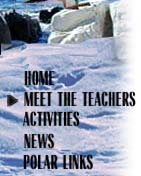
|
|
23 March, 2001
-051 16 Longitude
035 25 S Latitude
Recycling Aboard The Ship
My name is Robbie Liben. I am the Network Administrator on the ship. I keep
the computers running and the users happy. I've also started a recycling
program on board. At home, I do computer work for environmental
organizations, native rights groups and a range of progressive non-profits.
My heart is in the politics and computer support is how I can help good
organizations do what needs to be done. I have done such work since my
eighth grade class gathered 20,000 signatures on a petition to the New York
City Council to pass a bottle bill in the 1970s.
I've worked for two summers at McMurdo Station, the largest research base
in Antarctica. The only waste that stays in McMurdo is sewage. Everything
else, including food waste is sent back to the US. There are almost thirty
categories of waste segregation there, and most people there are pleased
that recycling is so easy and so thorough. It wasn't always that way,
though. Winter Quarters Bay, the port at McMurdo, is one of the most
polluted bays in the world. Up until 1990 the Navy way to deal with waste
was to put it on the sea ice and wait for the ice to melt. The Antarctic
Treaty says that anyone can inspect any country's bases anywhere in
Antarctica at any time. So in 1990 Greenpeace showed up and inspected
McMurdo. They documented this behavior and got news stories about it
printed in several US newspapers. The National Science Foundation changed
how waste is managed there. Now McMurdo is a model of how effective a
recycling can be.
When I inquired about shipboard recycling most people just laughed. The
ships are based in Punta Arenas, Chile, and there are apparently no
recycling facilities there. The past two cruises I've been on have started
in Hobart, Australia, which has an excellent recycling program. During the
first cruise, I worked with the Captain and the Marine Projects Coordinator
to set up collection points for recyclables. Most people, scientists, crew
and support staff greeted the new program enthusiastically.
This cruise we've collected 300-400 kg, so far. Materials include paper,
cardboard, cans, plastic and glass. We've set up a place down below deck in
the cargo hold for storing the stuff. Cape Town, South Africa, our next
port, also has good recycling facilities and can accept everything we've
collected. The volunteer help of Romeo and Wendy has been invaluable. The
pictures are of me (with the beard) and Romeo.
So, what will happen next? For now, the recycling program on this ship
will end with this cruise. After Cape Town the ship is heading back to
Punta Arenas where there are no recycling facilities. The next time I am in
Punta Arenas I will investigate whether environmental groups there may be
trying to create them. Recycling should be a way of life and I want to do
what I can to help make it a reality where ever I go.
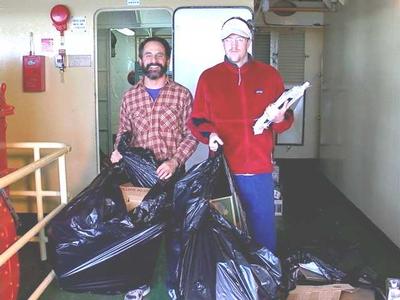
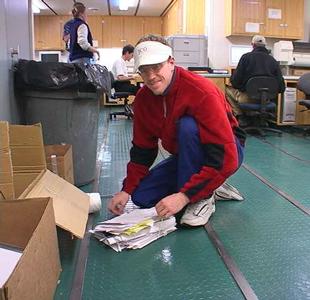
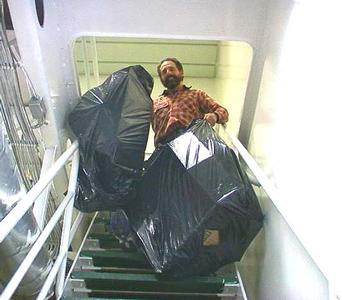
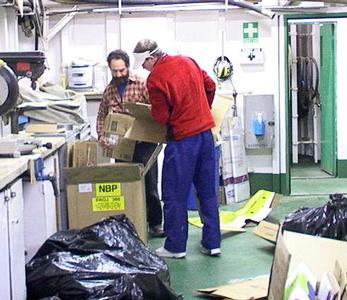
Contact the TEA in the field at
.
If you cannot connect through your browser, copy the
TEA's e-mail address in the "To:" line of
your favorite e-mail package.
|
